Skin Cancer
The Prevalence of Skin Cancer and the Importance of Early Detection
Skin cancer is the most common form of cancer worldwide, affecting millions of people each year. In the United States, the Skin Cancer Foundation reports that 1 in 5 Americans will develop some form of skin cancer by the age of 70. Skin cancer arises when abnormal cells in the skin begin to grow uncontrollably, often signaled by changes in existing moles or the appearance of new growths. The three most prevalent types of skin cancer are melanoma, basal cell carcinoma, and squamous cell carcinoma.
Early detection is crucial for successful treatment and improving the chances of positive outcomes. Regular full-body skin examinations by a dermatologist are essential in identifying skin cancer at an early stage.
Committed to Your Skin Health: Skin Cancer Care in Atlanta
At Dermatology Affiliates, we are committed to helping you achieve and maintain optimal skin health through education, prevention, and the early detection of skin cancer. Our dedication to skin health and positive patient outcomes is central to everything we do, which is why we include a Total Body Skin Exam (TBSE) as part of your annual appointment.
Total Body Skin Exams allow our providers to thoroughly assess the overall condition of your skin and identify any areas of concern. By prioritizing regular skin exams, we empower you to take proactive steps in safeguarding your skin's health, ensuring that any potential issues are detected and addressed as early as possible.
Examples of Skin Cancer
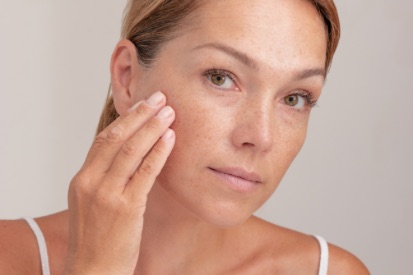
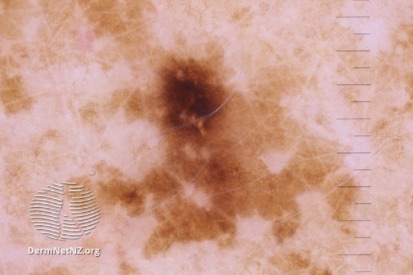
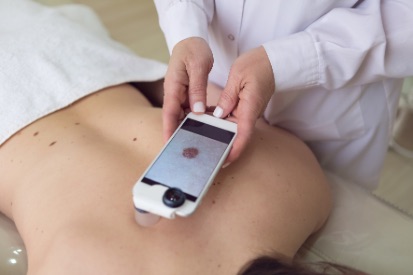

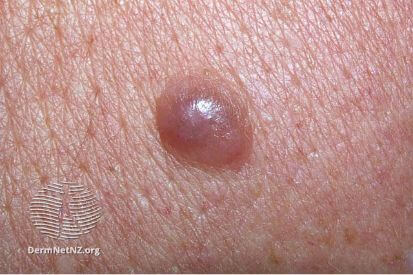
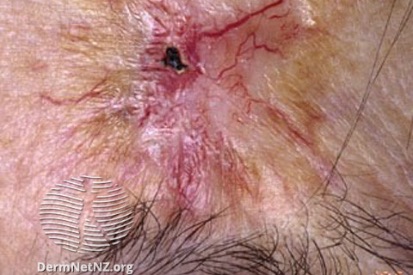
How to Spot Skin Cancer
Skin cancer can present in various ways, which is why it’s important to stay alert to any changes in your skin. Recognizing subtle or persistent skin changes early can significantly impact diagnosis and treatment outcomes for skin cancer. If you notice anything unusual, it’s best to consult a dermatologist at Pinnacle Dermatology for a professional evaluation.
Common skin cancer symptoms include:
- Changes in the size, shape, or color of existing moles
- New growths or spots that look different from other areas of your skin
- Sores or lesions that don’t heal, or heal and return
- Bumps that are pearly, waxy, or have a translucent appearance
- Rough, scaly patches or crusted areas on the skin
What Causes Skin Cancer?
As mentioned above, skin cancer often begins with damage to the DNA of skin cells, most commonly from ultraviolet radiation. Over time, this damage can lead to abnormal cell growth and cancer development.
At Pinnacle Dermatology, we understand the many factors contributing to skin cancer risk. We are committed to helping you identify and manage those risks through expert care, personalized prevention strategies, and routine skin exams.
Common skin cancer causes include:
- Excessive UV exposure from the sun or artificial sources like tanning beds
- Frequent sunburns, especially during childhood or adolescence
- Fair skin, light hair, and light-colored eyes (lower melanin levels mean less natural protection)
- A history of skin cancer or precancerous lesions
- Weakened immune system, due to illness or medications
- Exposure to toxic substances, such as arsenic
- Genetic factors or a family history of skin cancer
- Chronic skin inflammation or injuries in the same area over time
How to Prevent Skin Cancer
While skin cancer is one of the most common cancers, it’s also one of the most preventable. Every day presents an opportunity to protect your skin and reduce your risk through simple, consistent habits. From daily sun safety to staying aware of changes in your skin, skin cancer prevention starts with awareness—and ends with action.
At Pinnacle Dermatology, we empower our patients with the knowledge and care they need to take charge of their skin health. Through daily protection, self-checks, and annual total body skin exams, you can stay one step ahead and safeguard your health for the long term.
Daily Protection Habits
Daily protection starts with healthy skin habits. Use a broad-spectrum sunscreen with SPF 30 or higher every day, even on cloudy days, and reapply regularly. Wear protective clothing like wide-brimmed hats and long sleeves, and seek shade during peak sun hours (10 a.m. to 4 p.m.) to minimize UV exposure.
Importance of Regular Skin Self-Exams
Perform a monthly skin cancer self-exam to check for new moles or changes in existing spots. Use a mirror to examine all areas of your body, including hard-to-see places. If you notice anything suspicious, such as changes in shape, color, or size, schedule a visit with a dermatologist immediately.
Annual Total Body Skin Exams at Pinnacle Dermatology
An annual total body skin exam with a Pinnacle Dermatology provider offers a thorough, professional evaluation of your skin. During the exam, we check for any abnormal moles, lesions, or changes. Early detection dramatically improves treatment success, making these yearly exams vital to your skin health routine.
Frequently Asked Questions: Skin Cancer
Skin cancer is a form of cancer that originates in the skin cells. It commonly develops on sun-exposed areas but can also appear on skin that isn’t regularly exposed to sunlight. There are three primary types of skin cancer: basal cell carcinoma, squamous cell carcinoma, and melanoma.
Basal cell carcinoma and squamous cell carcinoma are more prevalent and generally have a higher cure rate. In contrast, melanoma is less common but significantly more aggressive, with a higher potential to spread to other parts of the body. Early detection and treatment are critical in managing all forms of skin cancer effectively and improving patient outcomes.
The leading risk factor for skin cancer is exposure to ultraviolet (UV) radiation, whether from the sun or tanning beds. Additional risk factors include fair skin, a history of frequent sunburns, a family history of skin cancer, and a weakened immune system. Exposure to certain environmental factors, such as arsenic, also increases the risk. Individuals with a large number of moles or those who spend significant time outdoors without adequate sun protection are at an even higher risk. Preventive measures, including regular use of sunscreen and protective clothing, can significantly reduce the likelihood of developing skin cancer.
The signs of skin cancer can vary depending on the type. Common signs include changes in the size, shape, color, or texture of a mole or spot on the skin. Itching, tenderness, or bleeding may also occur. It's crucial to be vigilant and seek medical attention if you notice any unusual changes on your skin.
Treatment for skin cancer is tailored to the type, size, and location of the cancer, as well as the patient’s overall health. Common treatment options include surgical removal of the cancerous tissue, radiation therapy, and in certain cases, chemotherapy or immunotherapy.
Early detection greatly improves the chances of successful treatment, making regular skin checks and prompt medical attention essential. Additionally, newer therapies, such as targeted therapy and biologic treatments, may be considered depending on the specific characteristics of the cancer. Comprehensive care that considers the patient’s overall well-being is critical in achieving the best outcomes.
You should apply sunscreen every day, even on cloudy days and during the winter, UV rays can still penetrate the clouds and cause skin damage. Sunscreen needs time to be absorbed into the skin. We recommend applying it at least 15 minutes before going outdoors and reapplying every two hours.
A total body skin exam conducted by a dermatologist is essential for several important reasons. Firstly, it acts as a proactive step in the early detection of skin cancers, including melanoma, the most dangerous form of skin cancer. When detected early, skin cancers are often highly treatable. This thorough examination enables the dermatologist to evaluate moles, birthmarks, and any unusual skin changes that could signal potential concerns.
Additionally, a dermatologist can diagnose and treat various skin conditions such as dermatitis, psoriasis, and infections. Early identification and treatment of these issues can prevent them from developing into more serious health problems.
Moreover, a total body skin exam offers a valuable opportunity to discuss any concerns or questions you may have about your skin health, sun protection, and skincare routines. Dermatologists can provide expert advice on skin cancer prevention, stressing the importance of measures like wearing sunscreen and protective clothing.
Regular skin exams are especially crucial for those with risk factors, such as a family history of skin cancer, significant sun exposure, or fair skin. In summary, a total body skin exam is a proactive and thorough approach to maintaining skin health, preventing skin cancers, and addressing any skin-related concerns in a timely manner.
From Our QualDerm Family of Brands: What to Expect at a Total Body Skin Exam
Skin Cancer Treatments
Receiving a skin cancer diagnosis can feel overwhelming, but treatment options today are highly effective, especially when the condition is caught early. At Pinnacle Dermatology, we provide personalized care plans tailored to your specific type, stage, and location of cancer. Whether your treatment involves non-surgical methods or advanced surgical techniques, our experienced providers are here to guide you every step of the way.
Non-Surgical Treatments
For certain types and early stages of skin cancer, non-surgical options can be effective. These may include topical medications, cryotherapy (freezing), or targeted therapies that destroy cancer cells without incisions. Your Pinnacle Dermatology provider will determine if a non-invasive approach is appropriate for your condition.
Surgical Treatments
Surgical treatments are often the most effective option for removing skin cancer, especially in more advanced or high-risk cases. Procedures may include excisional surgery or Mohs micrographic surgery, which precisely removes cancerous tissue while preserving healthy skin. Pinnacle Dermatology offers expert surgical care tailored to your needs and diagnosis.
Featured Blogs
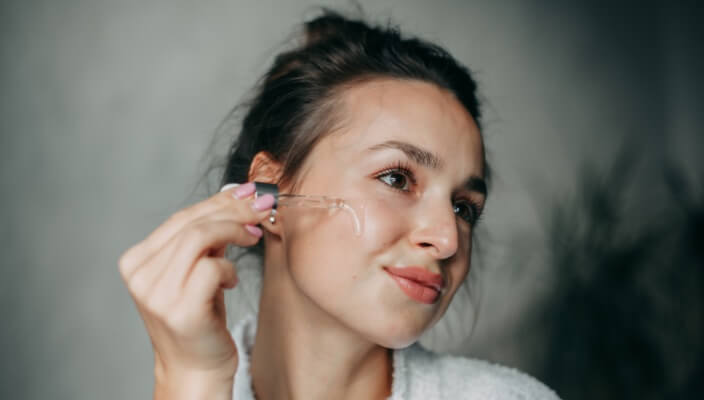
- Skin Care
- Botox
- Cosmetic Treatments
Retiniods are proven to combat fine lines, brown spots and improve texture, “tret” has been shown to enhance collagen production, even skin tone, unclog pores, and smooth skin texture.
Read More
- Skin Cancer
- General Dermatology
- Sun Safety
A skin cancer story shared by a Dermatology Affiliates employee. Learn how easy it is for skin cancer to sneak into your life in many ways.
Read More
- Sun Safety
- Skin Care
- Cosmetic Treatments
These are the years where all of one's hard work pays off. They are hopefully applying a daily sunscreen, antioxidant, retinol, or other collagen booster. In addition to those products, they are also using focused treatments for their eyes and neck, as well as utilizing growth factors or peptides.
Read MoreFeatured Products for Sun Protection
Check your local office for current stock!
Check your local office for current stock!


